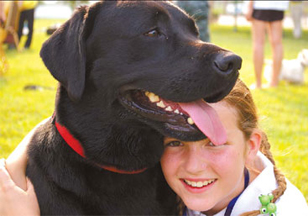| Home / Living in China / Life in Pictures | Tools: Save | Print | E-mail | Most Read |
| Expatriates |
| Adjust font size: |
When Birgit Eberlein and her family traded their Before leaving
Franziska Eberlein, 10, and her beloved Buddy. The Eberlein family value Buddy so much that they brought him from With guidance from a It cost 1,000 euros ($1,339) for the black labrador to travel in the cargo section of the Lufthansa plane and once it was inspected by Customs staff, it was delivered to the family's home in "I was really nervous about how to go with a dog to
Ask any expatriate about relocating their dog or registering it in One rule is consistent: all dogs in "The rules for pets extend to everybody and the laws are absolutely clear: all dogs must be registered, it's a legal requirement for any dog owner," says Mary Peng of the Although registration fees vary in Foreigners who relocate to "To bring a pet in, you can't be a tourist and you have to be a lawfully employed person with a Z visa or a PRC national," says Peng. Peng says given that every locality may have slightly different registration fees and other rules, it is wise to check with your building owner about the jurisdiction in order to register your dog at the nearest Public Security Bureau. The first-time dog registration fee is 1,000 yuan ($131) in Some owners say they pay much less to register outside downtown One rule setting Australian Mary Pryce, who worked in a dog shelter in "I was brought up to respect all animals so we've always had animals and such," says Pryce who lives in It cost 400 yuan ($52) to register her dog, but Pryce paid 300 yuan ($39) because it was neutered, an incentive available in many parts of the city. Carol Wolfson, founder and executive director of the non-profit Second Chance Animal Aid in "Most expatriates take care of their dogs in terms of medical care and yearly vaccinations but they think they live in 'safe' areas and do not need to get a license for their dogs," Wolfson says. "We get calls from expats who are of course distraught because their dog has been seized and they cannot get it back, and they blame the police. "We ask if the dog is licensed and they say no." Wolfson adds that the police have the legal authority to seize a dog and most are not returned. "This is simply irresponsible pet ownership," she says. "If people do not, or cannot, pay the yearly licensing fee in Before moving to Experts recommend pet owners check with specific airlines about dog transport facilities and pricing. They should also get in touch with relocation companies prior to leaving their homeland. There is no requirement to use a relocation company but many believe it is better because company representatives will meet the owner and pet at the airport and handle the paperwork. Once on Chinese soil, all dogs are subject to quarantine. In The government charges if they conduct the quarantine in their facility and charges about 1,500 yuan ($198) for one week. In Meanwhile, Eberlein of Berlin says their eight months in Despite being unable to swim in local lakes, as he did in ( |
| Tools: Save | Print | E-mail | Most Read |
 |
| Related Stories |
|

